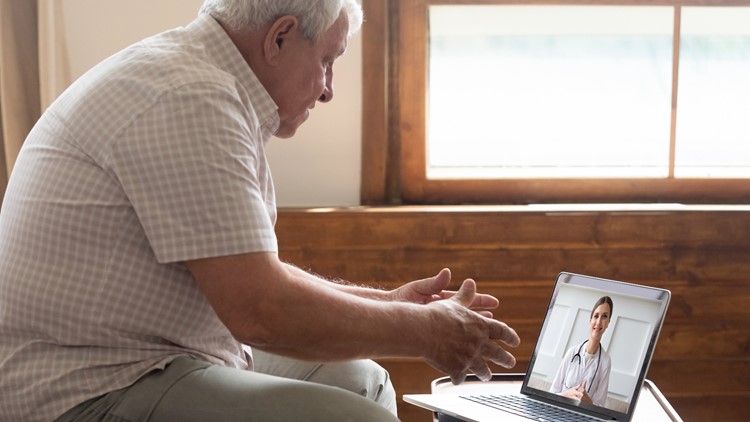SEATTLE — COVID-19 is changing almost every aspect of our lives, including the way we access healthcare. Rick Abbott, Vice President of Product and Market Solutions for Premera, believes that telemedicine is here to stay, and will keep growing for good reason.
"In the month of February, we had about 3,000 claims come through for telehealth. In April, we had over 70,000. So it just shows how quickly we've adapted to this new world."
In the near future, Abbott says we can expect to have on-demand access to primary care, "Take out your phone and within 90 seconds, you will be either having a text-based or video-based encounter with a physician. Where that physician is located could be potentially anywhere in the country, but they will be licensed to work in Washington."
He says physicians will do everything they can to solve their patients issues using telehealth, and under insurance plans like Premera, the appointment will be free. If the matter can't be solved remotely, he expects access to brick and mortar offices will be accessible at lower price points, too.
Healthcare providers are embracing telemedicine to help as many people as possible. Abbott has been amazed watching providers like Boulder Care, who provide online access to opiate-use disorder treatment, step forward, "They have agreed to see any patient that comes through regardless of whether you have coverage or not."
Telehealth may grow into an extremely useful tool for our senior community, especially those who are homebound. Because of the rapid spread of the virus in elder care facilities, many wonder if the healthcare model for seniors needs to change.
Homage is the largest provider of services for older adults and people with disabilities in the Snohomish county. Director of Social Services, Ramonda Sosa, says there needs to be a paradigm shift of how we consider our elders, "Really helping them fare through not only COVID, but even flu, or pneumonia, or other diseases. To really ensure that they're safeguarded, and that they're safe, and we're just doing all we can to care for them. I hope to see that be a community effort."
Sosa says we should be stepping forward and doing things like making extra phone calls to Seniors who may be living in isolation, "If they're having to shelter in place in their rooms, in order to stay safe and to save their life, then we need to find ways to reach them and to know that they are cared for," said Sosa, "It matters what happens to them. I think as a community, we need to do that."
Doctor David Johnson with the behavioral health non-profit Navos says it's important that we fully recognize the trauma COVID-19 is causing globally. The affects it will have on us as a society will linger for a long time and we will come out the other side as different. That is traumatic. "We are traumatized. It is a legitimate trauma. It's a Life and Death trauma, and we are going to have to process it and integrate it and weave it into our being consciously or it will haunt us forever."
Dr. Johnson acknowledges we are in dark times but sees light at the end of the pandemic tunnel, "When we go through a trauma of any kind, we learn things, as well as lose things. We have wisdom that we wouldn't have had before. And that wisdom will come in handy in the future."
He says we've got to face it head on, "It would be great if this had never happened. That's the first choice. The second choice is 'this has happened'. We make ourselves be resilient. We learn to be a survivor."
"There is the strength that gives us confidence. We need to learn to tell ourselves the story of how we were resilient -- so that in times of discouragement in the future, we can take out that story. Remind ourselves of what we've overcome. And that will help us overcome other things in the future."
Mental Health Resources
- Call King County's 24-hr hotline at 1-866-4274747 or 1-866-4CRISIS. "The 24-Hour Crisis Line provides immediate help to individuals, families, and friends of people in emotional crisis." CrisisConnections.org
This segment is part of the virtual town hall The Way Forward hosted by KING 5 and Premera Blue Cross. We asked viewers to share with us their biggest questions and concerns about life post-pandemic and gathered regional experts to provide the answers. All segments are available at king5.com/thewayforward. Sponsored by Premera Blue Cross.
Segment Producer Joseph Suttner. Watch New Day Northwest 11 AM weekdays on KING 5 and streaming live on KING5.com. Contact New Day.



